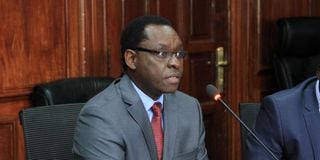Winners of flawed Kemsa tenders to return money

Outgoing Solicitor General Kennedy Ogeto.
Companies and individuals that were beneficiaries of flawed Covid-19 procurement at Kenya Medical Supplies Authority (Kemsa) will be made to return the excess cash received, Solicitor-General Kennedy Ogeto has said.
Appearing before the National Assembly Public Investment Committee yesterday, Mr Ogeto said entities that supplied items at inflated prices and have not been paid will only get their money based on current rates.
He told the team chaired by Mvita MP Abdulswamad Nassir, which is looking into the Sh7.8 billion procurement at Kemsa, that illegal contracts are not enforceable.
“If anyone was paid in a flawed and illegal contract, we have the right to recover the difference and prefer criminal action on parties involved,” Mr Ogeto said.
Before the investigations by the Ethics and Anti-Corruption Commission (EACC) started and all payments to suppliers stopped, Kemsa had paid about Sh4 billion.
Special report
While agreeing with the findings of the special report by the Auditor-General, which said Kemsa broke procurement laws in the purchase of Covid-19 related materials, Mr Ogeto said those who broke the law would be held criminally liable.
In her special report, Auditor-General Nancy Gathungu said Kemsa chief executive Jonah Manjari ignored the discount offer of Sh4,500 a pack as had been agreed between a supplier and the agency’s tender evaluation committee and instead allowed companies to supply at Sh9,000.
Dr Manjari remains suspended alongside directors Eliud Muriithi (Commercial) and Charles Jume (Procurement) as investigations into the scandal continue.
With the decision likely to attract legal suits from the suppliers and individuals, Mr Ogeto told the committee that his office would resort to a doctrine known in law as “quantum meirut” or reasonable payment for work done.
Citing a 2019 High Court ruling in the case of Multi-Line Motors (K) Ltd and Migori county government, the Solicitor-General said illegal contracts are never enforceable.
“Having not followed the law, the plaintiff willingly and in full knowledge engaged into illegal contracts. In such a scenario, the law is clear that such contracts are unenforceable,” the court said.
The court added that it is the duty of contractors and the procuring entities to observe the law.
Mr Ogeto appealed to the committee to make recommendation in its final report for the formation of a team – comprising representatives of the Auditor-General, Public Procurement Regulatory Authority, Treasury and other State entities – to devise ways of fair pay.
“Instead of going round the issue, we need to look at it with objectivity. I suggest the formation of a multi-agency team to help us determine a fair price for the suppliers,” Mr Ogeto told the lawmakers.
However, Budalangi MP Raphael Wanjala said it will amount to an illegality on the side of the government since the two entities— suppliers and Kemsa— entered into an agreement and signed before supplying.
“Who will in this case be held criminally liable, is it the suppliers or Kemsa because the two entities agreed on the prices jointly,” asked Mr Wanjala.
According to Mr Wanjala, the suppliers whose products have not been used should be given back their products since they supplied at a higher price.
Covid-19 procurements
“The best way to deal with this issue is to tell the suppliers to go and pick up their goods at Kemsa stores,” Mr Wanjala said.
The Solicitor-General also informed the committee that the Attorney-General was not consulted by Kemsa to give an advisory opinion on any of the Covid-19 procurements.
Mr Ogeto shocked the lawmakers that up to date, the office of the Attorney General has not seen any of the 102 contracts signed by individuals or firms with the authority to confirm whether they are legal or irregular.
“We wish to advise that any recommendations in respect of irregular or illegal contracts entered by Kemsa in the context of Covid-19 related procurements will depend on the facts and circumstances of each specific contract,” Mr Ogeto said.
“Therefore, in order to advise in this regard, there is need for the office of the Attorney General to be provided with the specific contracts for review and analysis before informed and considered recommendations may be made to this committee.”





